The establishment of the Robert Menzies Institute at the University of Melbourne has caused an outcry among students and academics who are concerned that universities are now being influenced by the “highest bidder.”
Due to open in September in the Old Quadrangle, the prime ministerial library and museum is a joint venture between UniMelb and the Menzies Research Centre (MRC) – a Liberal Party affiliated think-tank.
The project is jointly funded by the University of Melbourne and the Federal Government, which gave the Institute a $7 million grant in 2017. Benefactors such as right-wing commentator Alan Jones have also contributed to funding and continuing support will be provided by the MRC.
The Institute’s purported aim is to “uphold and promote Sir Robert’s legacy and vision for Australia as a country of freedom, opportunity, enterprise and individual dignity” through lectures, exhibitions, public forums and hosting school visits.
Students and academics are waging a campaign against the Institute, which they believe is comparable to the Ramsay Centre for Western Civilisation’s conservative agenda on university campuses, save for the fact the Menzies Institute will not be involved in teaching or curriculum development.
An open letter signed by more than 450 people objects to the Institute and Menzies’ legacy as a “supporter of the White Australia policy, South African apartheid, using Indigenous land for mining and atomic bomb testing, countless acts of war and genocide.”
Dr Jeanine Leane, a Wiradjuri academic at UniMelb, objects to “the veneration of a man like Robert Menzies, who was actively racist, who contributed to the genocide of First Nations people, [and] who supported a White Australia Policy.”
“I object to a centre that continues to condone and promote these kinds of monocultural and white supremacist philosophies on the lands never ceded of the Wurrunjeri peoples.”
Jack Buksh, the President of the University of Melbourne Students’ Union, told Honi that the campaign has “picked up a lot of steam” with a rally planned in August pending the end of Melbourne’s lockdown.
Buksh said students and academics’ main concern is that partisan political groups are exercising influence on campus: “Over years and years, we’ve had a structural gutting of universities and now they’re reliant on these funds. When you dangle $7 million in front of them, yeah they’ll probably take it.”
“As far as we can tell, there hasn’t actually been any consultation, it’s never come up at the Academic Board and there were no academics consulted about this private research centre.”
While prime ministerial libraries have been established at other universities — such as Western Sydney University’s Whitlam Institute — these centres are governed by bipartisan boards and are not directly affiliated with either major political party.
Critics fear that while the Institute proclaims to support open debate it “will in reality function as a bastion for the Liberal Party on campus.”
The governing structure of the Menzies Institute is decidedly partisan, featuring Sky News roustabout Peta Credlin, former Howard government Cabinet Minister David Kemp, and Geoffrey Hone, the Chairman of the right-wing Institute of Public Affairs think-tank.
Leigh Clifford, a Liberal Party donor and former Qantas Chairman, is the Chairman of the Board.
The Executive Director of the Institute is Georgina Downer, daughter of former Foreign Minister Alexander Downer and a two-time failed Liberal candidate in her father’s former seat.
Tom Harley, a former chairman of the Menzies Research Centre, has said that “it would be good to have someone else [on the board] that came from some other part of the political spectrum, to make it relatively bipartisan.”
Both Downer and UniMelb claim that the Institute will be independent. A University spokesperson told Honi that “The Institute’s constitution confirms that it has an independent and non-partisan status, and it aims to encourage debate and discussion of Sir Robert’s legacy.”
As well as concerns about political influence, opponents of the Institute object to the University’s decision to allocate $7 million to the centre at a time of supposed fiscal insecurity.
Buksch told Honi that “at UniMelb we’ve had about 450 staff sacked in the last 12 months, we’ve had a lot of subjects cancelled or paused for the next three years…and yet when we’re told [University management] are focussing on the ‘priorities,’ millions of dollars are poured into this politically aligned institute.”
The funding for the project was originally announced by UniMelb in 2017, well before the COVID crisis.
Student and staff backlash against the Institute has been criticised by right-wing groups.
John Roskam, Executive Director of the IPA told Sky News that “we are facing an attempt to shut down freedom of speech, narrow opinion and not introduce students to new ideas…What we are seeking is frankly the cancer that is affecting our schools and universities.”
Henry Kerr, President of the University of Melbourne Liberal Club, said he understood how the Institute could be perceived as partisan, but argued that “centre-right people feel very outgunned within the academic world…so I don’t think it’s that unreasonable for an institute like this to be more partisan than the other [prime ministerial libraries].”





